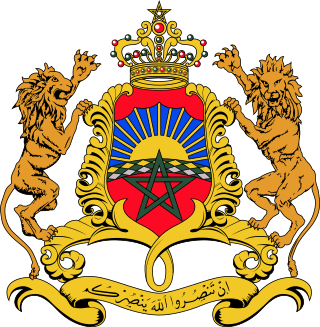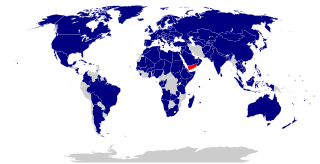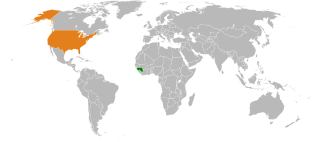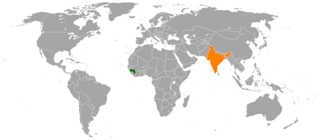
The Foreign relations of Egypt are the Egyptian government's external relations with the outside world. Egypt's foreign policy operates along a non-aligned level. Factors such as population size, historical events, military strength, diplomatic expertise and a strategic geographical position give Egypt extensive political influence in the Middle East, Africa, and within the Non-Aligned Movement as a whole. Cairo has been a crossroads of the Arab world's commerce and culture for centuries, and its intellectual and religious institutions are at the center of the region's social and cultural landmarks.

Guinea, officially the Republic of Guinea, is a coastal country in West Africa. It borders the Atlantic Ocean to the west, Guinea-Bissau to the northwest, Senegal to the north, Mali to the northeast, Cote d'Ivoire to the southeast, and Sierra Leone and Liberia to the south. It is sometimes referred to as Guinea-Conakry after its capital Conakry, to distinguish it from other territories in the eponymous region such as Guinea-Bissau and Equatorial Guinea. Guinea has a population of 13.5 million and an area of 245,857 square kilometres (94,926 sq mi).
The modern state of Guinea did not come into existence until 1958, but the history of the area stretches back well before European colonization. Its current boundaries were determined during the colonial period by the Berlin Conference (1884–1885) and the French, who ruled Guinea until 1958.

The foreign relations of Guinea, including those with its West African neighbors, have improved steadily since 1985.

Morocco is a member of the United Nations and belongs to the African Union, Arab League, Arab Maghreb Union (UMA), Organisation of Islamic Cooperation (OIC), the Non-Aligned Movement and the Community of Sahel-Saharan States (CEN-SAD). Morocco's relationships vary greatly between African, Arab, and Western states. Morocco has had strong ties with the West in order to gain economic and political benefits. France and Spain remain the primary trade partners, as well as the primary creditors and foreign investors in Morocco. From the total foreign investments in Morocco, the European Union invests approximately 73.5%, whereas the Arab world invests only 19.3%. As of 2009, many countries from the Persian Gulf and Maghreb regions are also becoming more involved in large-scale development projects in Morocco.

Senegal's first President, Léopold Senghor, advocated close relations with France and negotiation and compromise as the best means of resolving international differences after Senegal's independence from its status as a French colony. To a large extent, the two succeeding presidents, Abdou Diouf and Abdoulaye Wade, have carried on Senghor's policies and philosophies. Senegal has long supported functional integration among French-speaking West African states through the West African Economic and Monetary Union.

The foreign relations of Yemen are the relationships and policies that Yemen maintains with other countries. It is a member of the United Nations, the Arab League, and the Organisation of Islamic Cooperation. Yemen participates in the nonaligned movement. The Republic of Yemen accepted responsibility for all treaties and debts of its predecessors, the YAR and the PDRY. Additionally, India acceded to the Nuclear Non-Proliferation Treaty and has stressed the need to render the Middle East region free of nuclear and other weapons of mass destruction.

The Republic of Guinea-Bissau follows a nonaligned foreign policy and seeks friendly and cooperative relations with a wide variety of states and organizations. France, Portugal, Angola, Brazil, Egypt, Nigeria, Libya, Cuba, the Palestine Liberation Organization, Ghana, and Russia have diplomatic offices in Bissau.

Alpha Condé is a Guinean politician who served as the fourth president of Guinea from 2010 to 2021.

Equatorial Guinea – United States relations are bilateral relations between Equatorial Guinea and the United States.

Guinea – United States relations are bilateral relations between Guinea and the United States.

Mozambique – United States relations are bilateral relations between Mozambique and the United States.

Sierra Leone – United States relations are bilateral relations between Sierra Leone and the United States.

The following outline is provided as an overview of and topical guide to Guinea:

Guinea–India relations are the bilateral relations between Guinea and India. India maintained an embassy in Conakry, but shut it down after more than 2 decades of operation in 1988. Subsequently, the Embassy of India in Abidjan, Côte d'Ivoire was jointly accredited to Guinea. Guinea opened its embassy in New Delhi in April 2012. India has maintained an honorary consul in Guinea since 1989.

Guinea–Spain relations are the bilateral and diplomatic relations between these two countries. Guinea has an embassy in Madrid and honorary consulate in Barcelona, Las Palmas de Gran Canaria and Valencia. Spain has an embassy in Conakry.

Guinea–Turkey relations are the foreign relations between Guinea and Turkey. Guinea opened its embassy in Ankara and Turkey opened its embassy in Conakry in 2013.

















